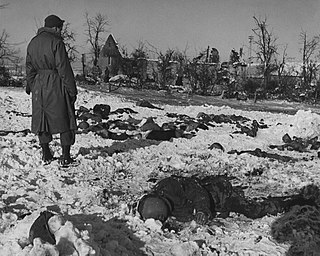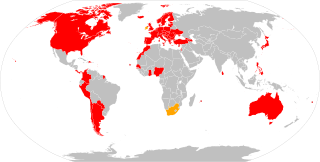Related Research Articles

The European Convention on Human Rights is an international convention to protect human rights and political freedoms in Europe. Drafted in 1950 by the then newly formed Council of Europe, the convention entered into force on 3 September 1953. All Council of Europe member states are party to the convention and new members are expected to ratify the convention at the earliest opportunity.

A treaty is a formal, legally binding written contract between actors in international law. It is usually made by and between sovereign states, but can include international organizations, individuals, business entities, and other legal persons.

A war crime is a violation of the laws of war that gives rise to individual criminal responsibility for actions by combatants in action, such as intentionally killing civilians or intentionally killing prisoners of war, torture, taking hostages, unnecessarily destroying civilian property, deception by perfidy, wartime sexual violence, pillaging, and for any individual that is part of the command structure who orders any attempt to committing mass killings including genocide or ethnic cleansing, the granting of no quarter despite surrender, the conscription of children in the military and flouting the legal distinctions of proportionality and military necessity.
The Convention for the Unification of certain rules relating to international carriage by air, commonly known as the Warsaw Convention, is an international convention which regulates liability for international carriage of persons, luggage, or goods performed by aircraft for reward.

The International Covenant on Civil and Political Rights (ICCPR) is a multilateral treaty that commits nations to respect the civil and political rights of individuals, including the right to life, freedom of religion, freedom of speech, freedom of assembly, electoral rights and rights to due process and a fair trial. It was adopted by United Nations General Assembly Resolution 2200A (XXI) on 16 December 1966 and entered into force on 23 March 1976 after its thirty-fifth ratification or accession. As of June 2022, the Covenant has 173 parties and six more signatories without ratification, most notably the People's Republic of China and Cuba; North Korea is the only state that has tried to withdraw.

The law of war is the component of international law that regulates the conditions for initiating war and the conduct of hostilities. Laws of war define sovereignty and nationhood, states and territories, occupation, and other critical terms of law.
International human rights law (IHRL) is the body of international law designed to promote human rights on social, regional, and domestic levels. As a form of international law, international human rights law are primarily made up of treaties, agreements between sovereign states intended to have binding legal effect between the parties that have agreed to them; and customary international law. Other international human rights instruments, while not legally binding, contribute to the implementation, understanding and development of international human rights law and have been recognized as a source of political obligation.

The American Convention on Human Rights, also known as the Pact of San José, is an international human rights instrument. It was adopted by many countries in the Western Hemisphere in San José, Costa Rica, on 22 November 1969. It came into force after the eleventh instrument of ratification was deposited on 18 July 1978.

The Hague Conventions of 1899 and 1907 are a series of international treaties and declarations negotiated at two international peace conferences at The Hague in the Netherlands. Along with the Geneva Conventions, the Hague Conventions were among the first formal statements of the laws of war and war crimes in the body of secular international law. A third conference was planned for 1914 and later rescheduled for 1915, but it did not take place because of the start of World War I.

A prize court is a court authorized to consider whether prizes have been lawfully captured, typically whether a ship has been lawfully captured or seized in time of war or under the terms of the seizing ship's letters of marque and reprisal. A prize court may order the sale or destruction of the seized ship, and the distribution of any proceeds to the captain and crew of the seizing ship. A prize court may also order the return of a seized ship to its owners if the seizure was unlawful, such as if seized from a country which had proclaimed its neutrality.

The Hague Conference on Private International Law (HCCH) is an intergovernmental organisation in the area of private international law, that administers several international conventions, protocols and soft law instruments.

War can heavily damage the environment, and warring countries often place operational requirements ahead of environmental concerns for the duration of the war. Some international law is designed to limit this environmental harm.

The Convention on Cybercrime, also known as the Budapest Convention on Cybercrime or the Budapest Convention, is the first international treaty seeking to address Internet and computer crime (cybercrime) by harmonizing national laws, improving investigative techniques, and increasing cooperation among nations. It was drawn up by the Council of Europe in Strasbourg, France, with the active participation of the Council of Europe's observer states Canada, Japan, the Philippines, South Africa and the United States.

The Martens Clause is an early international law concept first introduced into the preamble of the 1899 Hague Convention II – Laws and Customs of War on Land. There are differing interpretations of its significance on modern international law, with some scholars simply treating the clause as a reminder international customary law still applies after a treaty is ratified while others take a more expansive approach where the clause provides that because international treaties cannot be all encompassing, states cannot use that as a justification for an action.
Air warfare must comply with laws and customs of war, including international humanitarian law by protecting the victims of the conflict and refraining from attacks on protected persons.
A peace congress, in international relations, has at times been defined in a way that would distinguish it from a peace conference, as an ambitious forum to carry out dispute resolution in international affairs, and prevent wars. This idea was widely promoted during the nineteenth century, anticipating the international bodies that would be set up in the twentieth century with comparable aims.

The Geneva Conventions are international humanitarian laws consisting of four treaties and three additional protocols that establish international legal standards for humanitarian treatment in war. The singular term Geneva Convention usually denotes the agreements of 1949, negotiated in the aftermath of the Second World War (1939–1945), which updated the terms of the two 1929 treaties and added two new conventions. The Geneva Conventions extensively define the basic rights of wartime prisoners, civilians and military personnel; establish protections for the wounded and sick; and provide protections for the civilians in and around a war-zone.
The European Union's (EU) Treaty of Lisbon, in force since 1 December 2009, requires the EU to accede to the European Convention on Human Rights (ECHR). Article 6 of the consolidated Treaty on European Union states "The Union shall accede to the European Convention for the Protection of Human Rights and Fundamental Freedoms. Such accession shall not affect the Union's competences as defined in the Treaties." The EU would thus be subject to its human rights law and external monitoring as its member states currently are. It is further proposed that the EU join as a member of the Council of Europe now that it has attained a single legal personality in the Lisbon Treaty.

The Inter-American Convention on the Prevention, Punishment, and Eradication of Violence against Women, better known as the Belém do Pará Convention, is an international human rights instrument adopted by the Inter-American Commission of Women (CIM) of the Organization of American States (OAS) at a conference held in Belém do Pará, Brazil, on 9 June 1994. It is the first legally binding international treaty that criminalises all forms of violence against women, especially sexual violence. On 26 October 2004, the Follow-Up Mechanism (MESECVI) agency was established to ensure the State parties' compliance with the Convention.
References
- ↑ Scott, James Brown (1911). "The International Court of Prize". American Journal of International Law. 5 (2): 302–324. doi:10.2307/2186721. ISSN 0002-9300.
Primary:
- "Hague Convention XIII -Rights and Duties of Neutral Powers in Naval War: 18 October 1907, 36 Stat. 2415, 1 Bevans 723, 205 Consol. T.S. 395, 3 Martens Nouveau Recueil 713 (ser. 3), entered into force Jan. 26, 1910". University of Minnesota Human Rights Library. University of Minnesota . Retrieved 14 September 2017.
- "Convention relative to the establishment of an International Prize Court". Treaty Database. Government of the Netherlands. Retrieved 14 September 2017.
Secondary:
- Hudson, Manley O. (June 1943). "Chapter 4. The Proposed International Prize Court". The Permanent Court of International Justice 1920–1942 (A Treatise). New York: The Macmillan Company. pp. 71–79.